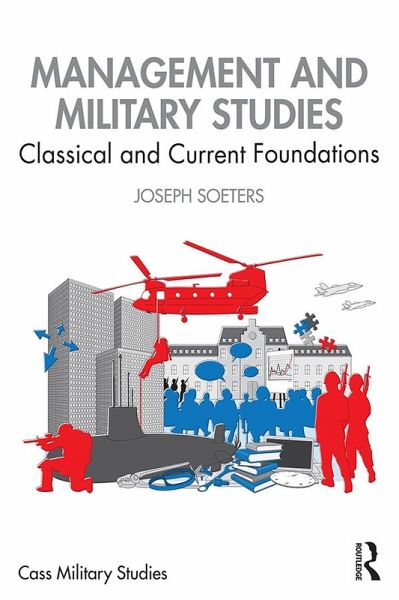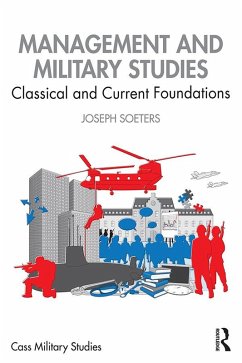
Management and Military Studies (eBook, ePUB)
Classical and Current Foundations
Versandkostenfrei!
Sofort per Download lieferbar
39,95 €
inkl. MwSt.
Weitere Ausgaben:

PAYBACK Punkte
20 °P sammeln!
This book connects findings and insights authored by famous scholars in management and organization studies with challenges the military is facing today.One assumes that management and organization studies is only about the rational, predictable, and manageable, and that military action is predominately irrational, unpredictable, and unmanageable; both assumptions are wrong. This book argues that the discipline of management and organization studies is highly relevant for the military in both peace- and wartime conditions, and for any situation in between. In all conditions, the giant and comp...
This book connects findings and insights authored by famous scholars in management and organization studies with challenges the military is facing today.
One assumes that management and organization studies is only about the rational, predictable, and manageable, and that military action is predominately irrational, unpredictable, and unmanageable; both assumptions are wrong. This book argues that the discipline of management and organization studies is highly relevant for the military in both peace- and wartime conditions, and for any situation in between. In all conditions, the giant and complex military organization needs to be structured, processed, administrated, led, and accounted for. Each chapter presented in this volume focuses on the contributions of founding thinkers in management and organization studies, with their work translated and applied to the military setting. These scholars are drawn from a variety of backgrounds, including organizational sociology, economics, political science, psychology, and engineering. Although the work of only a few explicitly refers to the military, the contributions of all these scholars are relevant in order to come to grips with security and military affairs. Together with many other academics' work, the contributions of these 18 scholars constitute the core of the field of management and organization studies.
This book will be of much interest to students of military studies, management studies, and organization studies.
One assumes that management and organization studies is only about the rational, predictable, and manageable, and that military action is predominately irrational, unpredictable, and unmanageable; both assumptions are wrong. This book argues that the discipline of management and organization studies is highly relevant for the military in both peace- and wartime conditions, and for any situation in between. In all conditions, the giant and complex military organization needs to be structured, processed, administrated, led, and accounted for. Each chapter presented in this volume focuses on the contributions of founding thinkers in management and organization studies, with their work translated and applied to the military setting. These scholars are drawn from a variety of backgrounds, including organizational sociology, economics, political science, psychology, and engineering. Although the work of only a few explicitly refers to the military, the contributions of all these scholars are relevant in order to come to grips with security and military affairs. Together with many other academics' work, the contributions of these 18 scholars constitute the core of the field of management and organization studies.
This book will be of much interest to students of military studies, management studies, and organization studies.
Dieser Download kann aus rechtlichen Gründen nur mit Rechnungsadresse in A, B, BG, CY, CZ, D, DK, EW, E, FIN, F, GR, HR, H, IRL, I, LT, L, LR, M, NL, PL, P, R, S, SLO, SK ausgeliefert werden.













